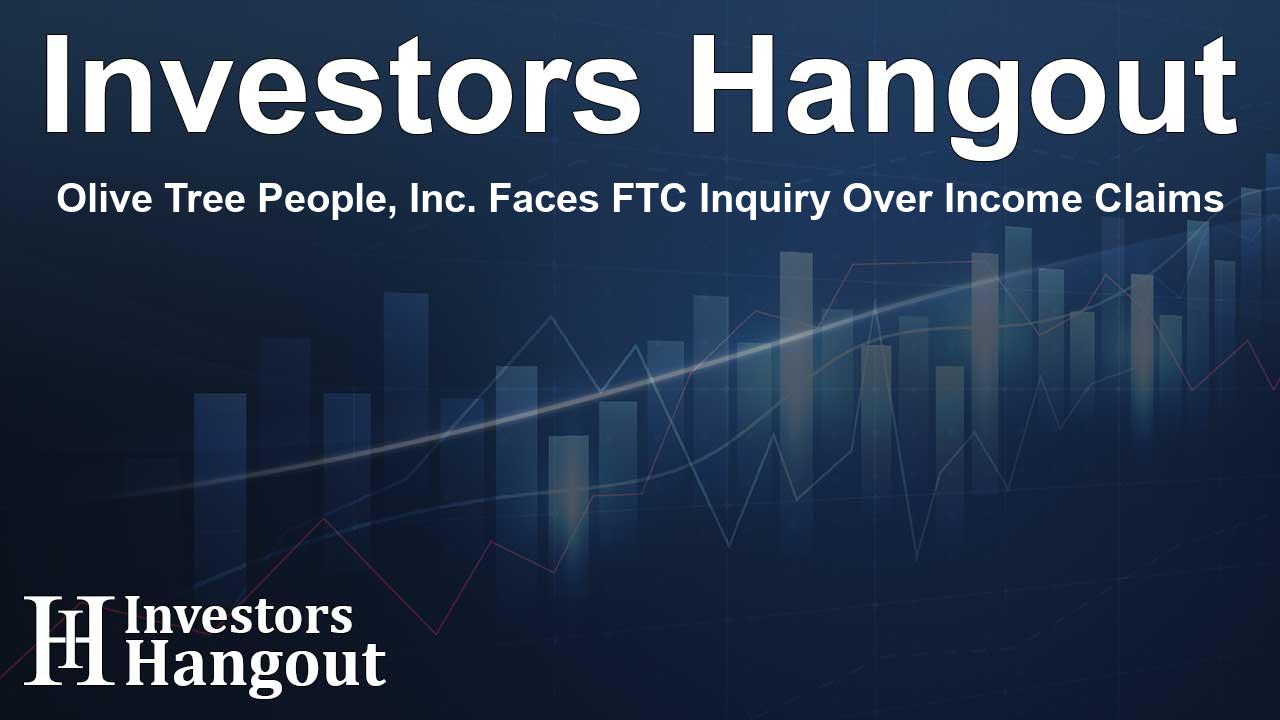Olive Tree People, Inc. Faces FTC Inquiry Over Income Claims

Olive Tree People, Inc. Under Investigation by FTC
Recently, the Direct Selling Self-Regulatory Council (DSSRC) referred Olive Tree People, Inc. to the Federal Trade Commission (FTC) for an investigation into potentially misleading earnings claims made by their salesforce members. This referral raises serious questions about the advertising practices of this direct selling company, which specializes in natural beauty and wellness products.
The Role of Direct Selling Self-Regulatory Council
The DSSRC operates as an independent body aimed at enforcing integrity and transparency in the direct selling industry. By monitoring advertising and marketing claims, the DSSRC helps ensure that businesses adhere to ethical standards, benefiting consumers and maintaining trust. The referral to the federal agency occurred after Olive Tree failed to provide satisfactory responses to inquiries regarding claims associated with their salesforce.
Concerns Over Earnings Claims
The inquiry focused on several specific claims made by salesforce members that implied significant earnings potential. For example, claims about achieving "financial freedom, incredible incentives," and assurances that one could transition from side income to a full-time income were flagged. Some of these assertions included:
- “Every sale is income — from side hustle to full-time income with commissions and bonuses.”
- “The possibilities are endless; it can be your main source of income!”
- “Financial freedom doesn’t require millions; it means more time with family and life's adventures.”
- “In just one month, I earned a trip, thanks to this amazing company!”
- “In my first year, I earned more than at my previous job; my team is thriving!”
These statements imply that joining Olive Tree can lead to extraordinary financial benefits and lifestyle changes, which led to scrutiny from the DSSRC as these implications do not appear to be substantiated.
Failure to Respond
Despite repeated requests from the DSSRC to clarify and substantiate their earnings claims, Olive Tree has not provided the necessary documentation. This lack of communication has compelled the DSSRC to escalate the matter to the FTC and the California Attorney General’s Office. Regulatory bodies are attentive to such matters to ensure that consumers are not misled by lofty claims that can lead to financial losses.
Consumer Trust and Ethical Marketing
It is crucial for direct selling companies like Olive Tree to uphold high standards when marketing their products and opportunities. BBB National Programs, under which DSSRC operates, emphasizes the importance of building consumer trust through transparency. Consumers should be able to make informed decisions based on accurate information regarding potential earnings from such ventures.
Understanding the Direct Selling Landscape
The direct selling industry offers unique opportunities but is often scrutinized for its marketing methods. Companies are urged to develop clear policies that align with ethical marketing and fair representation of potential earnings. As reform efforts continue, it is essential for businesses to prioritize truthfulness in their messaging to avoid potential legal repercussions.
About BBB National Programs
BBB National Programs has served as a critical pillar in ensuring consumer protection through various self-regulatory programs. For over 50 years, they've helped monitor compliance and resolve disputes, nurturing an environment where consumers feel safe engaging with businesses. Their initiatives not only support consumers but also encourage businesses to adopt best practices in marketing and ethics.
About the Direct Selling Self-Regulatory Council
The DSSRC seeks to safeguard both consumers and the broader market by holding businesses accountable for misleading claims. Their work is fundamental in fostering a healthier landscape for direct selling, encouraging companies to adhere to standards of integrity and fair advertising practices.
Frequently Asked Questions
What led to the FTC investigation of Olive Tree People, Inc.?
The investigation resulted from the DSSRC's referral to the FTC due to unaddressed earnings claims made by agents of Olive Tree that were deemed misleading.
What types of claims were made against Olive Tree's earnings?
Claims suggested that agents could easily achieve significant income and financial freedom, which raised red flags for regulatory compliance.
What does the DSSRC do?
The DSSRC monitors and regulates the advertising practices within the direct selling industry, ensuring truthful representation and consumer protection.
How does Olive Tree plan to address these issues?
It remains to be seen how Olive Tree will respond to these allegations, but they are urged to provide clarity and documentation to the appropriate authorities.
Why are earnings claims in direct selling companies often scrutinized?
Earnings claims can often lead to consumer deception if not substantiated, making it critical for companies to ensure their marketing is truthful and compliant with regulations.
About The Author
Contact Owen Jenkins privately here. Or send an email with ATTN: Owen Jenkins as the subject to contact@investorshangout.com.
About Investors Hangout
Investors Hangout is a leading online stock forum for financial discussion and learning, offering a wide range of free tools and resources. It draws in traders of all levels, who exchange market knowledge, investigate trading tactics, and keep an eye on industry developments in real time. Featuring financial articles, stock message boards, quotes, charts, company profiles, and live news updates. Through cooperative learning and a wealth of informational resources, it helps users from novices creating their first portfolios to experts honing their techniques. Join Investors Hangout today: https://investorshangout.com/
The content of this article is based on factual, publicly available information and does not represent legal, financial, or investment advice. Investors Hangout does not offer financial advice, and the author is not a licensed financial advisor. Consult a qualified advisor before making any financial or investment decisions based on this article. This article should not be considered advice to purchase, sell, or hold any securities or other investments. If any of the material provided here is inaccurate, please contact us for corrections.
